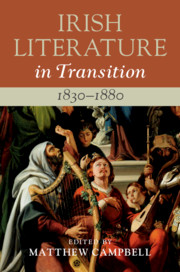Book contents
- Irish Literature in Transition, 1830–1880
- Irish Literature in Transition
- Irish Literature in Transition, 1830–1880
- Copyright page
- Contents
- Contributors
- Series Preface
- General Acknowledgements
- Acknowledgements
- Part I Contexts and Contents: Politics and Periodicals
- Part II Ireland and the Liberal Arts and Sciences
- Part III From the Four Nations to the Globalising Irish
- Chapter 8 England and Ireland, Tory and Whig: Thackeray, Trollope, Arnold
- Chapter 9 Imperial Minds: Irish Writers and Empire in the Nineteenth Century – Charles Gavan Duffy, Thomas Moore, Charles Lever and Kim
- Chapter 10 An Exiled History: Young Ireland from Mitchel to O’Leary
- Chapter 11 US Nation Building and the Irish-American Novel, 1830–1880
- Part IV The Languages of Literature
- Index
Chapter 9 - Imperial Minds: Irish Writers and Empire in the Nineteenth Century – Charles Gavan Duffy, Thomas Moore, Charles Lever and Kim
from Part III - From the Four Nations to the Globalising Irish
Published online by Cambridge University Press: 29 February 2020
- Irish Literature in Transition, 1830–1880
- Irish Literature in Transition
- Irish Literature in Transition, 1830–1880
- Copyright page
- Contents
- Contributors
- Series Preface
- General Acknowledgements
- Acknowledgements
- Part I Contexts and Contents: Politics and Periodicals
- Part II Ireland and the Liberal Arts and Sciences
- Part III From the Four Nations to the Globalising Irish
- Chapter 8 England and Ireland, Tory and Whig: Thackeray, Trollope, Arnold
- Chapter 9 Imperial Minds: Irish Writers and Empire in the Nineteenth Century – Charles Gavan Duffy, Thomas Moore, Charles Lever and Kim
- Chapter 10 An Exiled History: Young Ireland from Mitchel to O’Leary
- Chapter 11 US Nation Building and the Irish-American Novel, 1830–1880
- Part IV The Languages of Literature
- Index
Summary
The nature of empire is that it is always at heart contradictory, suggesting a totalising unity but not homogeneity or equality. This chapter focuses on three very different Irish men of letters, Charles Gavan Duffy, Thomas Moore and Charles Lever, exploring the contradictions at the heart of their engagement with the British Empire and the imperial project generally, and its influence on their writing. It also suggests ways in which these contradictions are later to be found in one of the great imperial novels – Rudyard Kipling’s Kim (1901). Charles Gavan Duffy was an Irish nationalist and a prime minister of a British colony, who saw Thomas Moore’s poetry as the product of an ‘imperial mind’. Moore, in his turn, can be seen as the colonised figure incarnate, beholden to imperial patronage for his livelihood and yet able to find ways to express subversive feeling in his poetry and prose. Charles Lever was perhaps the Empire’s favourite Irish novelist in this period, and yet he seldom wrote about the Empire, and when he did, it was almost always negative in tone. Although he was a moderate Tory in politics, Lever’s work suggested that the Irish could never be good Britons, or successful colonists. In contrast, Rudyard Kipling’s Kim, who in so many ways represents the anomalous position of the Irish in imperial terms, is presented as succeeding precisely because of his Irishness, even though he does not know what that is. The contradictions in Kim reflect the ironic relationship between the Irish and the Empire as a whole, and as such the novel can claim to be the greatest ‘Irish’ imperial novel, a term which is itself a contradiction in terms.
Keywords
- Type
- Chapter
- Information
- Irish Literature in Transition, 1830–1880 , pp. 143 - 161Publisher: Cambridge University PressPrint publication year: 2020



